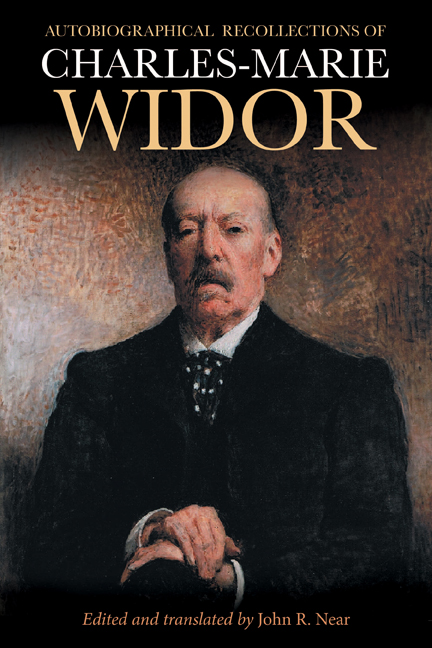Book contents
- Frontmatter
- Contents
- List of Illustrations
- Foreword
- Preface
- Acknowledgments
- Introduction: Tribute to Charles-Marie Widor
- Part One Studies, Early Performances, and Aristide Cavaillé-Coll (1844–69)
- Part Two La Belle Époque: The Franco-Prussian War to The Great War (1870–1914)
- Part Three The Great War and Important Initiatives (1914–37)
- Appendix 1 Birth record of Charles-Marie Widor, 1844
- Appendix 2 Widor’s Diplôme de Bachelier ès Lettres, 1863
- Appendix 3 Widor’s letter of appreciation to Jacques Lemmens, 1863
- Appendix 4 Brussels Ducal Palace organ specification, 1861
- Appendix 5 Widor’s certificate for Chevalier de l’Ordre du Christ, 1866
- Appendix 6 “To Budapest,” 1893
- Appendix 7 Widor’s travels to Russia and his 1903 passport
- Appendix 8 Widor’s list of his works in 1894
- Appendix 9 The Paris Conservatory organs, 1872
- Appendix 10 Chronique [Widor’s appeal for an organ hall at the Paris Conservatory, 1895]
- Appendix 11 Widor’s certificate for the Académie Royale, Brussels, 1908
- Appendix 12 “Debussy & Rodin,” 1927
- Appendix 13 The American Conservatory organ, Fontainebleau, 1925
- Appendix 14 Letters concerning the Trocadéro organ restoration, 1926
- Notes
- Bibliography
- Index
- Eastman Studies in Music
31 - 1894: Geneva, Third Symphony for Organ and Orchestra, op. 69
Published online by Cambridge University Press: 09 May 2024
- Frontmatter
- Contents
- List of Illustrations
- Foreword
- Preface
- Acknowledgments
- Introduction: Tribute to Charles-Marie Widor
- Part One Studies, Early Performances, and Aristide Cavaillé-Coll (1844–69)
- Part Two La Belle Époque: The Franco-Prussian War to The Great War (1870–1914)
- Part Three The Great War and Important Initiatives (1914–37)
- Appendix 1 Birth record of Charles-Marie Widor, 1844
- Appendix 2 Widor’s Diplôme de Bachelier ès Lettres, 1863
- Appendix 3 Widor’s letter of appreciation to Jacques Lemmens, 1863
- Appendix 4 Brussels Ducal Palace organ specification, 1861
- Appendix 5 Widor’s certificate for Chevalier de l’Ordre du Christ, 1866
- Appendix 6 “To Budapest,” 1893
- Appendix 7 Widor’s travels to Russia and his 1903 passport
- Appendix 8 Widor’s list of his works in 1894
- Appendix 9 The Paris Conservatory organs, 1872
- Appendix 10 Chronique [Widor’s appeal for an organ hall at the Paris Conservatory, 1895]
- Appendix 11 Widor’s certificate for the Académie Royale, Brussels, 1908
- Appendix 12 “Debussy & Rodin,” 1927
- Appendix 13 The American Conservatory organ, Fontainebleau, 1925
- Appendix 14 Letters concerning the Trocadéro organ restoration, 1926
- Notes
- Bibliography
- Index
- Eastman Studies in Music
Summary
There was a consul general of England in Geneva, Sir Daniel Barton, who had settled there. He had married the daughter of Lord Robert Peel; Mrs. [Barton] is still living. After her death, she is leaving her charming house in Sécheron to the city of Geneva. This house is located at the narrowing of the quai, on the left. It's a delightful house by the lake; the water seems to enter the dining room.
Barton was president of the Harmonie Nautique de Genève. Being very wealthy, he had the idea to have a hall built—Victoria Hall—for the rehearsals and performances of the brass band. He installed an organ there, and for the inauguration of his hall he asked me to compose a special work for organ and orchestra. We had a French scientist, Léon Massol, as an intermediary. He was a resident of Geneva where he was in charge of hygiene and public health in the city, and also represented the Pasteur Institute there. A witty old bachelor, he had the most adventurous life in the world. His father [Eugène Massol] had been a great singer, and had close ties to the Paris Conservatory, Saint-Saëns, Bizet, and all that generation.
One day, as François-Adrien Boïeldieu was crossing the Conservatory courtyard, he stopped to listen to a laborer [Eugène Massol] carrying a mortarboard on his shoulder and singing at the top of his voice. Boïeldieu stopped him and said: “Come down, you!” —“Oh no, I can’t!” Boïeldieu repeated: “Come on, get down! Instead of doing this stupid job, wouldn't you rather want to work on your voice?” —“I couldn't ask for more!” Boïeldieu got him into the Conservatory, recommended him, took care of him, and some time later it was he who created the [role of Rodolphe (tenor) in 1829] in Guillaume Tell.
Léon Massol had said to Barton: “Ask Widor to write this piece for you. He is a very special organist, in addition to being a composer. He will do this for you!” Massol was very eccentric and was infatuated with Barton; they had a yacht that they sailed on all the European canals in summer. It was thus for Barton that I went to Geneva to rehearse several times and to test the hall's organ by the Swiss builder Kuhn.
- Type
- Chapter
- Information
- Autobiographical Recollections of Charles-Marie Widor , pp. 63 - 64Publisher: Boydell & BrewerPrint publication year: 2024



